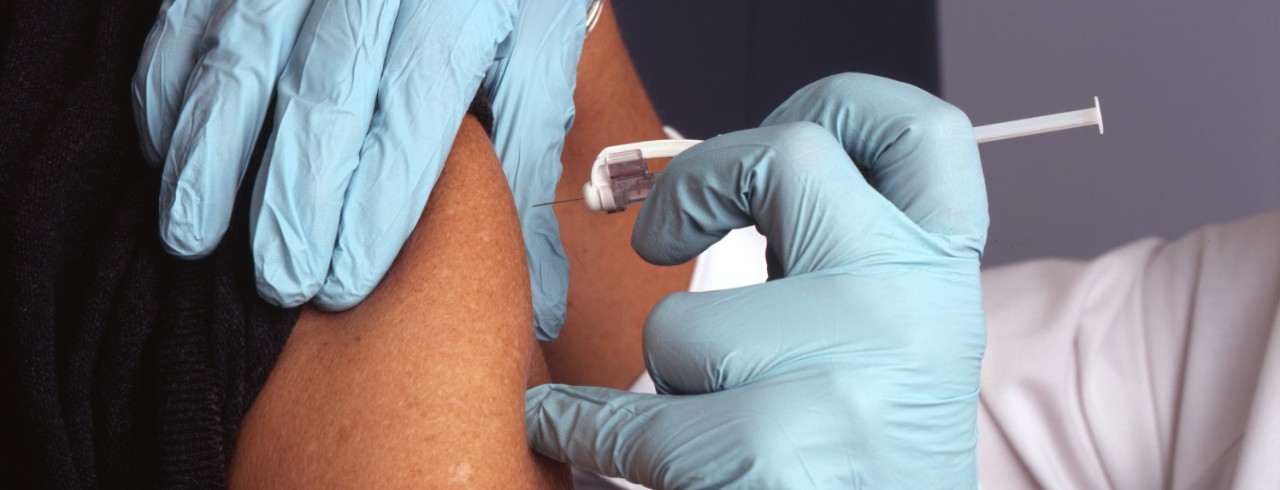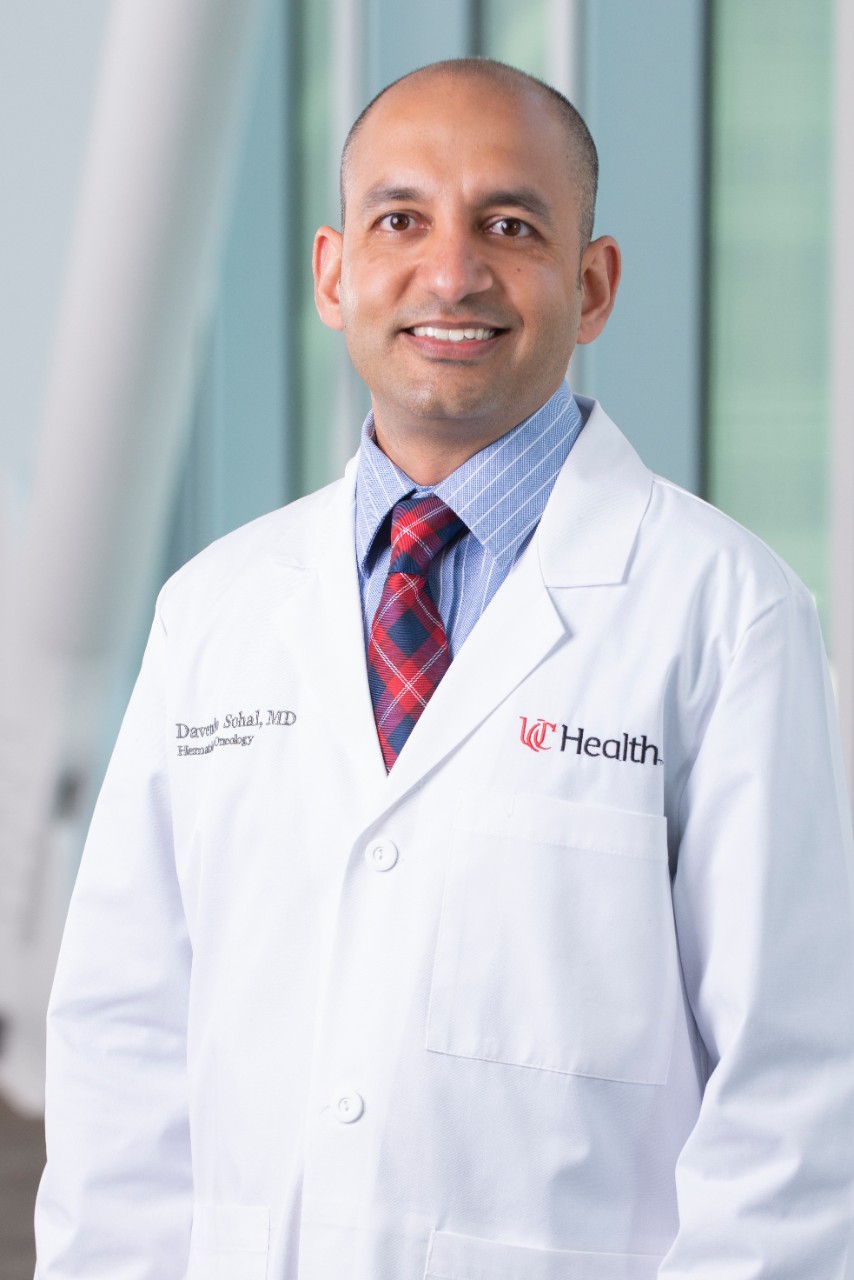
University of Cincinnati Cancer Center first in Midwest to open pancreatic cancer vaccine trial
Vaccine opens new frontier for cancer treatment
The University of Cincinnati Cancer Center is the first site in the Midwest enrolling patients in a new Phase 2 clinical trial testing a vaccine to treat pancreatic cancer.
According to the National Cancer Institute, more than 66,000 Americans will be diagnosed with pancreatic cancer in 2024. It ranks as the third leading cause of cancer death in women and fourth leading cause of cancer death in men.
Davendra Sohal, MD, site principal investigator, said this trial builds on the same mRNA technology that was used to develop vaccines for COVID-19.
“They took the COVID virus and sequenced it and then made a vaccine against its RNA sequence, and here they do the same thing,” said Sohal, associate director for clinical research at the Cancer Center and professor of internal medicine in UC’s College of Medicine. “After surgery to remove the tumor, a piece of it is taken and sent to the lab. They sequence the tumor, make a highly personalized vaccine to target each person’s cancer specifically, and send it back to us.”
The vaccine is developed in about four to six weeks while patients are recovering from surgery, and patients are then given six weekly injections of the vaccine. Following six months of standard chemotherapy, patients then receive six more vaccine injections as boosters.

Davendra Sohal, MD. Photo/UC Health
“There’s hardly any downside. These patients all get surgery and all get chemotherapy anyway,” Sohal said. “There’s no placebo (everyone knows what they are getting), and there’s no shortchanging them on standard treatment.”
Sohal said any patient diagnosed with pancreatic cancer that can be treated with surgery and has not started any other treatments, including radiation or chemotherapy, is eligible to enroll. The trial is aiming to enroll 260 patients across its sites globally, and Sohal said he hopes to enroll as many patients as possible in Cincinnati.
Side effects of the vaccine reported in the Phase 1 trial were minimal and similar to those for COVID-19 vaccinations, including mild aches, chills and a mild fever. In the Phase 1 trial, Sohal said eight out of 32 patients were completely cured of their cancer.
“That looks like a small number, but a 25% cure in pancreas cancer is much better than the current barely 5% cure,” he said. “So this can be game changing”
Sohal said mRNA vaccines are opening an exciting new frontier for cancer treatment, as researchers are testing this method in a variety of cancers in addition to pancreatic cancer.
“There are many opportunities, and this could certainly be the future of treating cancer,” he said.
For more information on the trial, please call 513-584-7698 or email cancer@uchealth.com.
Researchers: Learn more at Cancer Center GI cancer symposium
Vinod P. Balachandran, MD, a surgical oncologist at Memorial Sloan Kettering Cancer Center and principal investigator of the original pancreatic cancer vaccine trial, is the keynote speaker for the University of Cincinnati Cancer Center’s Multidisciplinary Management of Gastrointestinal Cancers Symposium Feb. 23. This symposium is for researchers, physicians/clinicians, nurses, residents, fellows and students.
Featured photo at top of a vaccine being administered. Photo/National Cancer Institute/Unsplash.
Related Stories
Local 12: 180 UC med students receive white coats, students embark on journey during pandemic
August 9, 2021
The University of Cincinnati College of Medicine welcomed 180 newly admitted first-year students during the college’s 26th annual White Coat Ceremony. The ceremony was held Friday at 10 a.m. at Cincinnati Music Hall, 1241 Elm Street. Each member of the class of 2025 were presented with a white lab coat, symbolizing entry into the medical profession. Local 12 covered the event.
GIVEHOPE and BSI Engineering Celebrate Ten Years of Driving Research
August 3, 2021
Years after two personal losses from pancreatic cancer, Cincinnati-based nonprofit GIVEHOPE and consulting firm BSI Engineering are celebrating a philanthropic partnership that has funded 13 pilot research projects at the University of Cincinnati Cancer Center.
Finding community and building a future
July 9, 2021
As a University of Cincinnati College of Medicine student, Sarah Appeadu, MD, ’21, remembers journaling on the “3 Cs” that got her through medical school: Community, community, community. Now, when she lists the people who supported her through four years of training—the last year in a global pandemic—it keeps growing: her family, her church, her classmates, and the college’s Office of Student Affairs and Office of Diversity, Equity and Inclusion. “I look back and it was such a crucial time to really be nurtured in that way,” she says. “I’m so thankful that I had those people. It shows being around the right people really mattered. That’s my same hope for residency even.”
New York Times: Flint Weighs Scope of Harm to Children Caused by Lead in Water
February 1, 2016
Kim Dietrich, a professor of environmental health at UC's College of Medicine, is quoted in this story on the medical problems that could develop among the thousands of young children exposed to lead-contaminated water in Flint, Mich.
Cancer-Causing Gene Found in Plasma May Help Predict Outcomes for Patients
February 18, 2016
Researchers at the University of Cincinnati have discovered that a human cancer-causing gene, called DEK, can be detected in the plasma of head and neck cancer patients.
UC Receives $1.9 Million to Study Pain
February 15, 2016
Jun-Ming Zhang, MD, of the UC College of Medicine, is the principal investigator of a $1.95 million grant to study the interacting roles of the sympathetic and sensory nervous and immune systems in back and neuropathic pain models.
MD Magazine: Generic Drug Equally Effective in Epilespy
February 22, 2016
Michael Privitera, MD, a professor of neurology at UC's College of Medicine and director of the Epilepsy Center at the UC Neuroscience Institute, is featured in this story about research he led that examined the efficacy of generic drug substitution for epilepsy.
UC to Host Regional Conference for Latino Medical Student Association
February 10, 2016
The University of Cincinnati chapter of the Latino Medical Student Association (LMSA) will host a Midwest regional conference Feb. 26-28, 2016, at the College of Medicine.
Heart Disease Still Top Killer of American Women and Men, Symptoms Differ
February 1, 2016
Women tend to get palpitations, shortness of breath and "sharp" chest pain when suffering heart attacks, explains Stephanie Dunlap, DO, in the UC College of Medicine.
Philosophy Professor Explores Fine Lines Between Right and Wrong in March 29 Public Lecture
March 13, 2016
What distinguishes psychopaths from the rest of us? UC Professor Heidi Maibom offers some clues at a 3:30 p.m. lecture, March 29, in the Russell C. Myers Alumni Center.
